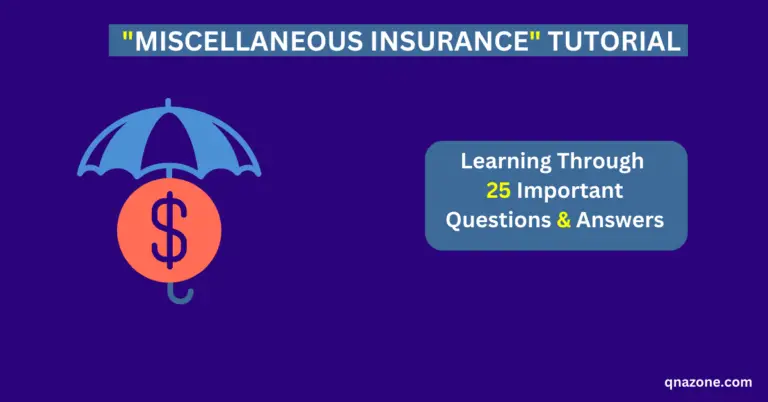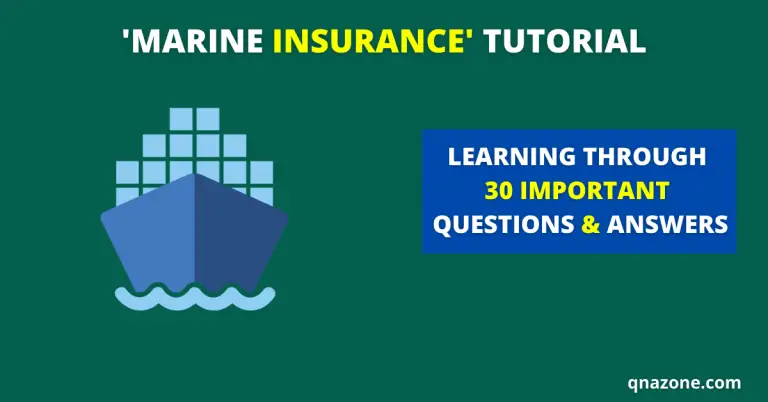25 Important Fire Insurance Questions and Answers [with PDF]
The 4th chapter of our Insurance learning course is “Fire Insurance”. In this article, we’ll learn the 25 most important Fire Insurance questions and their answers.
It will help you understand the important fire insurance terms and their explanations quickly.
You can read the previous three chapters of our insurance learning course here if you missed them.
- 30 Important Introduction to Insurance Questions and Answers [With PDF]
- 25 Important Life Insurance Questions and Answers [With PDF]
- 25 Important Marine Insurance Questions and Answers [With PDF]
By reading this post, you may quickly prepare for insurance courses and for any competitive tests such as school and college exams, vivas, job interviews, and so on.
So let’s get started.
Fire Insurance Questions and Answers
The 25 important Fire Insurance questions and answers are as follows:
Question 01: What is Fire Insurance?
Answer: Fire insurance is financial protection against fire hazards. Fire insurance is a contract between an insurer and a policyholder that guarantees a certain amount of money against damage caused by a fire risk on a specific property for a specified period of time.
Question 02: Who is the Father of Modern Fire Insurance?
Answer: Nicholas Bourbon, who was born in the United Kingdom, is known as the “Father of Modern Fire Insurance.
Question 03: What are the Features of Fire Insurance?
Answer: The important features of fire insurance are as follows:
- Fire insurance is a contract executed between two parties.
- The purpose is to protect the insured financially from the risk of fire.
- In case of fire damage, the insurer guarantees compensation.
- In this case, the insured property and the term of the contract must be specified.
- This is a compensation contact. So in this case as much as the damage is done to try to make up.
Question 04: What is the Significance of Fire Insurance?
Answer: The significance of fire insurance is as follows:
- Establishing a financial security system
- Aids in industrialization
- Provides security and relief
- Raises awareness
- Aids in risk distribution
- Assists in job creation
Question 05: Why Fire Insurance is Called the Contract of Indemnity?
Answer: The following are some of the notable reasons for having a fire insurance indemnity contract:
- In this case, the main purpose is to compensate the insured financially.
- The insurance company pays for a portion or all of the loss.
- If the loss does not occur, there is no need for a refund of the premium paid and
- The insurer is obliged to compensate in the judgment of the vested risk.
Question 06: What is the Classification of a Fire Insurance Policy?
Answer: The classification of the fire insurance policy is as follows:
- Valued Policy
- Unvalued Policy
- Specific Policy
- Average Policy
- Floating or Blanket Policy
- Excess Policy
- Declaration Policy
- Adjustable policy
- Maximum Value with Discount Policy
- Replacement Policy
Question 07: What is a Valued Policy?
Answer: If the insurance policy determines the value of the insured asset at the time of execution of the contract, the insurance policy is called the valued policy.
Question 08: What is an Unvalued Policy?
Answer: Unvalued policy is an insurance policy that occurs without determining the value of the insured item during the execution of the insurance contract, and the value will be determined later if a loss occurs.
Question 09: What is a Specific Policy?
Answer: Specific insurance policy refers to a fire insurance policy that refers to a specific amount of value against a specific amount of property, and in the event of loss, the insurance company is obligated to pay the specified amount of the insurance policy.
Question 10: What is the Average Policy?
Answer: The average insurance policy is one that is determined at an average rate without paying the amount specified in the insurance policy in the event of a loss.
Question 11: What is a Floating or Blanket Policy?
Answer: When the property of the same organization is kept or stored in different locations and all of the scattered properties are insured under the same policy, this is referred to as a floating or blanket policy.
Question 12: What is an Excess Policy?
Answer: Excess insurance policy is used in the case of fire insurance of goods stored in warehouses where goods are not stored for a fixed period of time but arrivals and departures occur on a regular basis. It is issued in conjunction with the original insurance policy.
Question 13: What is Declaration Policy?
Answer: The insurance policy in which the policyholder collects the insurance policy by specifying the value of the product for the maximum amount of product that he can have in stock at a given time and usually pays a 75% cash premium on that amount and adjusts the insurance premium at the end of the year by declaring the actual amount of product from time to time is called a declaration policy.
Question 14: What is an Adjustable Insurance Policy?
Answer: The term “adjustable insurance policy” refers to an insurance policy in which the premium is assessed by writing as actual inventory at the time of taking the policy and then adjusting the premium and finalizing the premium account at the end of the term by informing the insurer through the inventory reduction or increase declaration.
Question 15: What is the Maximum Value of the Discount Policy?
Answer: The maximum value with a discount policy is an insurance policy in which the maximum amount and value of inventory for the entire year are written and the premium is paid on that basis, and at the end of the year one-third of the received premium is paid to the policyholder due to a decrease or increase in the amount of inventory.
Question 16: What is a Replacement Policy?
Answer: Replacement policy refers to an insurance policy in which, in the event of loss of insured material, the insurer agrees to restore the property without indemnifying the insured.
Question 17: What is Fire Waste or Fire Loss?
Answer: Fire waste or risk refers to property damage caused by a fire.
Question 18: What are the Direct Causes of Fire Loss?
Answer: The direct causes of fire loss are as follows:
- Carelessness.
- Neglect and ignorance.
- Intentional arson by the enemy, etc.
Question 19: What are the Indirect Causes of Fire Loss?
Answer: The indirect causes of fire loss are as follows:
- Defective construction structure.
- Use of substandard materials.
- Adjacent location of installation or building.
- Presence of hidden gas or flammable substances.
- Cracks in thermal conductors or lines.
- Warehousing of combustibles.
- Buildings collapse, etc.
Question 20: What is Natural Risk?
Answer: Natural risks are the inherent risk of fire in an object or property. The majority of the time, fires caused by such risks cannot be effectively avoided.
Question 21: What are the Causes of Natural Risk?
Answer: The causes of natural risk are as follows:
- The highly flammable nature of the property or object.
- Defective construction structure.
- Defective heating system.
- Use dangerous processes.
- The nature of the organization.
- Defective branch layout.
- Lack of fire extinguishers.
Question 22: What is Moral Risk?
Answer: Moral risk is the risk posed by the insured’s character or the activities of those around him.
Question 23: What are the Causes of Moral Risk?
Answer: The causes of moral risk are as follows:
- Voluntary arson.
- Negligence and carelessness.
- Arson by the enemy.
Question 24: What is the Method of Claiming Losses and settlement of Fire Insurance?
Answer: The method of claiming losses and settlement of fire insurance is as follows:
Steps to be taken by Policyholder:
- Giving information
- Submission of claim letter
Steps to be taken by the insurer:
- Confirming the validity of the claim
- Enquiring regarding payment of premium
- Inquiry of damage
Appointment of an arbitrator if necessary
Payment of compensation
Question 25: Why is Fire Insurance Important against Fire Waste?
Answer: A fire hazard is a hazard or damage caused by a fire. With the advancement of civilization, the risk of fire has increased. Fire can damage factories, houses, vehicles, and farms for a variety of reasons. Enemies can also be set on fire. Fire insurance is necessary to obtain financial protection from fire damage caused by all of these direct and indirect causes.
I hope that by the end of this post, you have a good understanding of the “Fire Insurance” chapter.
You will gain a better understanding of the “Fire Insurance” chapter if you read these 25 important fire insurance questions and answers on a regular basis.





I learnt a lot by this article
Thanks a lot
thanks for providing these, it helps a lot
Good site you’ve got here.. It’s hard to find quality writing like yours nowadays. I seriously appreciate individuals like you! Take care!!
Can I simply say what a comfort to find a person that truly knows what they’re discussing over the internet. You actually realize how to bring an issue to light and make it important. More people must read this and understand this side of the story. It’s surprising you’re not more popular since you definitely possess the gift.